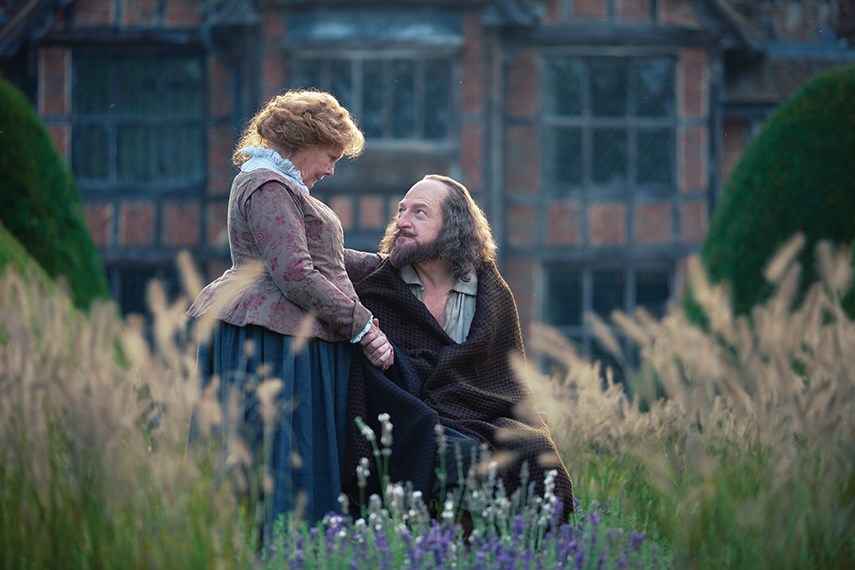All Is True. Directed by Kenneth Branagh. Starring Branagh and Judi Dench. Rating: 9 (out of 10).
In 1613 the Globe Theatre burned to the ground, during a mishap onstage in the middle of Shakespeare’s “Life of Henry VIII,” alternate title “All Is True.” It was the last straw for the bard, who returned home to Stratford-Upon-Avon after a 20-odd year absence determined to retire.
Little is known about these sunset years of Shakespeare’s, other than he never wrote again. Kenneth Branagh, the man who’s been bringing Shakespeare to the masses since 1989’s Henry V, for which he received Best Actor and Best Director Oscar nominations, paints a humanizing portrait of a man trying to reconnect with his family and with himself.
From the onset, director of photography Zac Nicholson gives the film a bucolic, painterly look worthy of a John Constable painting in the lush exteriors, of Vermeer in the candlelit interiors. Retirement must be a shock after the chaos of 17th-century London, but Shakespeare (Branagh) follows that well-trod path of retirees: he plants a garden.
It won’t be a seamless homecoming: his wife Anne (Judi Dench) is smarting from having to raise two daughters and mourn a dead son on her own, not to mention those scandalous sonnets to “a dark lady” and “handsome man” that were leaked to the public. Daughter Susanna (Lydia Wilson) has issues of her own, including fending off inheritance questions from her Puritanical husband (Hadley Fraser), the irony being that a man who wants to close all the theatres stands to profit greatly from them.
Daughter Judith (played by Kathryn Wilder) is another story. Her twin brother Hamnet died when they were 11, of plague, apparently, and her father has never gotten over it. She and her mother have long since mourned him, but having returned home Will sees the dead boy everywhere. Judith has survivor’s guilt, along with a surety that her father believes the wrong twin died.
Nitpick all you like about 84-year-old Dench playing Anne (who in real life was only eight years Shakespeare’s senior): if you know anything about Branagh’s casting choices – his colour-blind casting goes back to Denzel Washington in 1993’s Much Ado About Nothing, for example – you know he picks the best actors for the part (Keanu Reeves’ participation in the same film notwithstanding).
And despite his huge success, Will continues to try to outrun his criminal father and his shameful past, paying 20 pounds for a coat of arms in an attempt to legitimize the Shakespeare name and kowtowing to the local Lord (Alex Macqueen). “Christ, what do you care what he thinks, you wrote King Lear!” roars the Earl of Southampton, a longtime patron and inspiration for several of Shakespeare’s sonnets, and played to perfection by Ian McKellen. McKellen and Branagh orchestrate one of the film’s most moving scenes: two renderings of Sonnet 29. “For thy sweet love remembered such wealth brings/That then I scorn to change my state with kings,” one a pained declaration of love; one a sad comment on the chasm created by class.
The film meanders into unfamiliar territory for most viewers. An accusation of infidelity against Susanna, for example, results in a slander trial. And who knew that the Puritanical ideology that dominated Stratford-Upon-Avon at the time would provide such fun for the costume designers (those silly hats!). There’s irony in the fact that the world’s greatest dramatist and poet had an illiterate wife and one daughter who couldn’t read or write.
But this is a tale bookended by the late Hamlet, who asks for an ending to his story. It prompts a mini mystery that runs throughout the film, and a confession from Anne: “It was only a little lie. He was only a little boy.” A beautiful, melancholy film about the last three years of Shakespeare’s own story.



